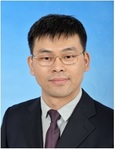Day 2 :
Keynote Forum
E Blair Holladay
CEO, American Society for Clinical Pathology, USA
Keynote: Theranostics in Cytopathology to address the need for Personalized Medicine in Healthcare
Time : 09:30-10:10

Biography:
Dr. Holladay is the American Society for Clinical Pathology (ASCP) Chief Executive Officer. He has focused on globalization initiatives for the medical laboratory community that include significant contributions to the President’s Emergency Plan for AIDS Relief (PEPFAR) funded through the Centers for Disease Control and Prevention; strategic partnerships in laboratory medicine; corporate reorganization and management activities; mergers and acquisitions; international outreach; external partnerships; health services research and delivery and also establishing the gold standard of certification for individuals within the United States and worldwide. ASCP has been funded for over 40 million dollars to support patient-centered care.
Abstract:
The field of cytopathology has evolved from basic Pap staining of tumors followed by H&E tissue diagnosis of disease to the use of immunocytochemistry and complementary ancillary molecular diagnostics to aid in specifying the disease. However, due to the sequencing of the human genome and the subsequent genomic revolution, the field of theranostics has evolved.
Theranostics is the coupling of companion diagnostic tools (in particular, molecular profiling) with specific therapeutic drugs. This "personalized" approach to diagnosis allows the clinician to provide therapy based on specific genetic mutations of the tumors from their patients. The FDA has dramatically increased the number of cleared/approved in vitro assays for patients with genetic mutations that respond to drugs that prevent the expression of the mutations, such as tyrosine kinase inhibitors. These alternative forms of therapy have dramatically increased the survival rate in patients with stage four and metastatic cancer. It is imperative that pathologists and laboratory professionals determine which companion diagnostic assay should be chosen and recommend the clinically actionable drugs tailored to their genetic mutation to the clinician. This change in the scope of practice creates unprecedented opportunities to more accurately diagnose patients and guide the selection of personalized therapies.
Keynote Forum
Xiangshan Fan
Nanjing University, China
Keynote: Seven rare cases of gastrointestinal tract
Time : 10:10-10:50

Biography:
Xiangshan Fan has completed his PhD from Nanjing University and ever been to MD Anderson Cancer Center as a Visiting Scholar. He is the Director of Department of Pathology, Drum Tower Hospital, Nanjing University Medical School. He is interested in gastrointestinal pathology, lymphoma and pulmonary pathology and has published more than 140 papers in peer-reviewed journals.
Abstract:
Here, seven very rare cases of gastrointestinal tract from Nanjing Drum Tower Hospital in China were reported, such as indolent T-cell lymphoproliferative disease of the gastrointestinal tract involving the colon and tonsil, gastric plasmablastic lymphoma, gastric cancer with lymphoid stromal caused by EB virus combined with monoclonal B-cell lymphoproliferative disease, hepatoid adenocarcinoma with liver metastasis, gastroblastoma, choriocarcinoma, pancreatic acinar-like adenocarcinoma of the proximal stomach invading the esophagus and so on. It is very important for pathologists to understand and identify these very rare diseases accurately for the appropriate treatment and patient’s management.
